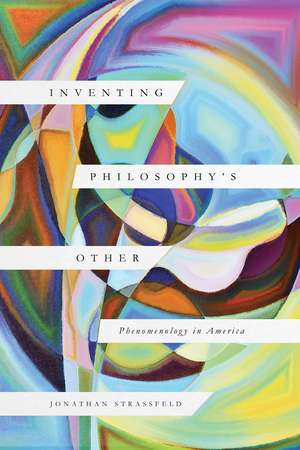Inventing Philosophy's Other: Phenomenology in America
Autor Jonathan Strassfelden Limba Engleză Paperback – 14 oct 2022
Phenomenology and so-called “continental philosophy” receive scant attention in most American philosophy departments, despite their foundational influence on intellectual movements such as existentialism, post-structuralism, and deconstruction. In Inventing Philosophy’s Other, Jonathan Strassfeld explores this absence, revealing how everyday institutional practices played a determinative role in the development of twentieth-century academic discourse.
Conventional wisdom holds that phenomenology’s absence from the philosophical mainstream in the United States reflects its obscurity or even irrelevance to America’s philosophical traditions. Strassfeld refutes this story as he traces phenomenology’s reception in America, delivering the first systematic historical study of the movement in the United States. He examines the lives and works of Marjorie Grene, Alfred Schütz, Hubert Dreyfus, and Iris Marion Young, among others, while also providing a fresh introduction to phenomenological philosophy.
| Toate formatele și edițiile | Preț | Express |
|---|---|---|
| Paperback (1) | 186.28 lei 3-5 săpt. | +19.73 lei 6-12 zile |
| University of Chicago Press – 14 oct 2022 | 186.28 lei 3-5 săpt. | +19.73 lei 6-12 zile |
| Hardback (1) | 564.25 lei 6-8 săpt. | |
| University of Chicago Press – 17 oct 2022 | 564.25 lei 6-8 săpt. |
Preț: 186.28 lei
Nou
Puncte Express: 279
Preț estimativ în valută:
35.65€ • 38.87$ • 30.06£
35.65€ • 38.87$ • 30.06£
Carte disponibilă
Livrare economică 03-17 aprilie
Livrare express 19-25 martie pentru 29.72 lei
Preluare comenzi: 021 569.72.76
Specificații
ISBN-13: 9780226821597
ISBN-10: 0226821595
Pagini: 352
Ilustrații: 6 line drawings
Dimensiuni: 152 x 229 x 23 mm
Greutate: 0.51 kg
Ediția:1
Editura: University of Chicago Press
Colecția University of Chicago Press
ISBN-10: 0226821595
Pagini: 352
Ilustrații: 6 line drawings
Dimensiuni: 152 x 229 x 23 mm
Greutate: 0.51 kg
Ediția:1
Editura: University of Chicago Press
Colecția University of Chicago Press
Notă biografică
Jonathan Strassfeld holds a PhD in history from the University of Rochester.
Cuprins
Introduction
1 Understanding Phenomenology
2 First Encounters
A Marjorie Glicksman Grene
3 Philosophy in Conflict
B Alfred Schütz
4 Who Rules Philosophy?
C Hubert Dreyfus
5 Becoming Continental
D Iris Marion Young
6 Flanking Maneuvers
Conclusion
Acknowledgments
Appendix: Quantitative Sources and Methods
List of Abbreviations
Notes
Bibliography
Index
1 Understanding Phenomenology
2 First Encounters
A Marjorie Glicksman Grene
3 Philosophy in Conflict
B Alfred Schütz
4 Who Rules Philosophy?
C Hubert Dreyfus
5 Becoming Continental
D Iris Marion Young
6 Flanking Maneuvers
Conclusion
Acknowledgments
Appendix: Quantitative Sources and Methods
List of Abbreviations
Notes
Bibliography
Index
Recenzii
“Inventing Philosophy’s Other is an ambitious, important, and exceptional . . . first-rate history of American philosophy that reminds us that the ‘best’ ideas don’t simply win out on their merits. Rather, they often come to be labeled as such after their influence is established through the vagaries of institutional contingency. At a time when the line dividing the continental and analytic traditions appears to be wearing thin, we would do well to heed this injunction for historical reflection.”
"By intertwining philosophical analysis, institutional histories, and vibrant biographical portraits, Strassfeld explains an important but poorly understood chapter in the recent history of American philosophy."
“Strassfeld is one of the most talented young scholars writing about the history of academic thought. Ambitious and comprehensive, Inventing Philosophy’s Other suggests that the triumph of analytic philosophy in America was neither preordained nor determined strictly on the basis of the quality of thought.”
“Strassfeld offers the fullest account yet of phenomenology’s fate in the United States. Revisiting a rich intellectual tradition inspired by the works of Edmund Husserl, Martin Heidegger, and Maurice Merleau-Ponty, Inventing Philosophy’s Other restores some of the dynamic pluralism of American philosophy, even as it exposes the forces—intellectual as well as institutional—that have railed against it.”
